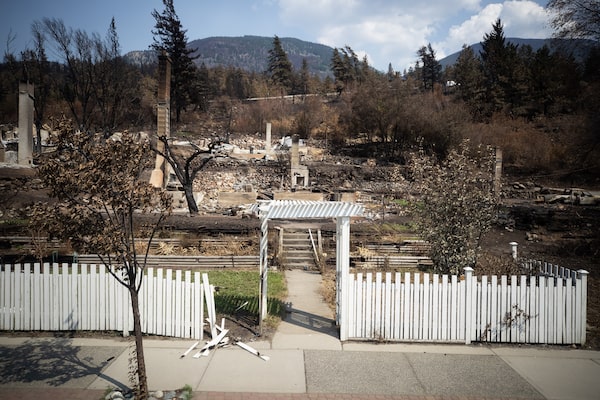
Damaged structures are seen in Lytton, B.C., on July 9, 2021, after a wildfire destroyed most of the village on June 30.DARRYL DYCK/The Canadian Press
For years, the Earth has been telling us how sick the planet is – and Indigenous communities have borne disproportionate pain from that sickness.
It has become harder for elders to predict the weather because the sky and the sunsets today look different, clouded by pollution. Winter ice roads, which represent lifelines to remote Northern communities, are not as reliable as they once were. Hunting seasons are changing. The migration pattern of birds have been disrupted. Water levels are rising, storms are getting more severe and forest fires are becoming more brutal and commonplace.
The latest report from the United Nations Intergovernmental Panel on Climate Change, or IPCC, delivered this week, has projected even more devastation: We are not on track to preventing the average global temperature from rising more than 1.5 C above preindustrial levels, and the world is not prepared for that. This is not news to many Indigenous peoples; we understand how complex and intertwined our relationship is between the land and ourselves. The Anishinabek worldview is that we are all connected, and if you overuse and abuse the land and water, the natural order of things is disturbed.
The report’s timing has only made things grimmer. The world has found itself engaged in a potentially catastrophic war – one that threatens to turn back the clock on both our geopolitical and environmental state of affairs.
From the Coastal GasLink pipeline expansion project planned on traditional Wet’suwet’en territories, to the now-cancelled Keystone XL pipeline, which would have moved 800,000 barrels of oil every day from Alberta to Texas, Indigenous communities and allies have been on the front lines, trying to convince colonial governments that turning back to oil exploration, increased fracking and coal extraction threatens us all.
But just as the gains of these efforts were starting to be felt, circumstances have completely changed. After Russia’s invasion of Ukraine, many European countries ended the import of Russian energy sources on which they relied – meaning that governments that were beginning to ease their dependence on oil and gas are now being forced to double down to feed their societies. Germany, for instance, imports about 35 per cent of its oil and 55 per cent of its natural gas from Russia, and with national energy policies being torn up and rewritten on the fly over the past week, it is unlikely that climate-change concerns will be prioritized when filling these gaps. And so an already energy-hungry global community may find itself abandoning progressive climate-change initiatives in the name of feeding its relentless appetite for fossil fuels – the extraction of which is the main driver of climate change.
The IPCC also noted that gains toward Indigenous self-determination and inherent land rights will be increasingly elusive amidst a hunt for natural resources. The fight to hold colonial governments to account will now be that much harder in courtrooms and on our traditional territories – despite the pain we’ve already suffered. After all, don’t forget Indigenous peoples have had their nations taken over, land rights taken away and treaties completely ignored. Racist policies were developed to kick people off the land and make way for others. Children were taken away and thrown into residential schools, where they were abused into no longer knowing who they were. Canada confronts the realities of these crimes every day; on Tuesday, Kapawe’no First Nation announced that 169 potential unmarked graves were found at the site of St. Bernard’s Indian Residential School.
Yet the world also finds itself in need of what we know. The IPCC report – which was signed off by the governments of 195 countries – noted that “prospects for climate resilient development are increased by inclusive processes involving local knowledge and Indigenous Knowledge.” But is the world ready to listen and change its ways, especially with a world potentially at war?
Last summer, I stood on the pow wow grounds of Tk’emlúps te Secwe̓pemc, surrounded by evacuees from the town of Lytton, B.C., and Skeetchestn Indian Band, who had fled nearby forest fires. Folks had pitched tents, looking for refuge from the intense burning heat and fast-moving blazes that had driven them out of their homes.
At the time, First Nations leaders and community members were there to hear the report on the discovery of children’s remains at the site of the former Kamloops Indian Residential School. But it was not lost on me that ashes were also falling from the sky, covering our cars and ourselves, filling our lungs with the destruction of what mankind had wrought. The Earth’s message could not have been any louder. We are all connected.
Keep your Opinions sharp and informed. Get the Opinion newsletter. Sign up today.
 Tanya Talaga
Tanya Talaga